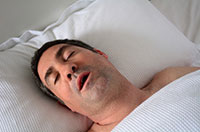 Sleep apnea is a disorder in which breathing repeatedly starts and stops during sleep. Snoring loudly is a common symptom, but it's not the only sign – and snoring doesn't necessarily indicate sleep apnea. Dentists tend to be the first doctors to identify a sleep apnea problem in their patients, since people tend to visit dentists more frequently than physicians.
Sleep apnea is a disorder in which breathing repeatedly starts and stops during sleep. Snoring loudly is a common symptom, but it's not the only sign – and snoring doesn't necessarily indicate sleep apnea. Dentists tend to be the first doctors to identify a sleep apnea problem in their patients, since people tend to visit dentists more frequently than physicians.
What is Sleep Apnea?
Sleep apnea is a common but potentially serious disorder that occurs when your breathing repeatedly pauses during sleep. Sleep cycles are disrupted when breathing stops and then restarts normally, leading to poor quality of sleep and excessive tiredness during the day.
The most common type of sleep apnea is obstructive sleep apnea. It occurs when the airway is blocked as the muscles in the back of the throat relax. Breathing pauses when the airway is blocked and resumes once the brain senses the lack of breath and quickly, briefly interrupts sleep to resume normal breathing.
Central sleep apnea is rarer; it occurs when the brain doesn't signal the body to breathe for a period of time.
If You Don't Snore, Can You Still Have It?
Snoring is one of the leading indicators of sleep apnea. But people who snore don't always have sleep apnea, and individuals who don’t snore could still be affected.
People with central sleep apnea often do not snore. Their bodies simply do not attempt to breathe for a period of time during sleep. Those suffering from central sleep apnea often struggle to fall asleep or stay asleep, or wake up short of breath.
If you’re not sure if you snore but you frequently wake up during the night, experience shortness of breath after sleep, or suffer from extreme tiredness throughout the day, you may have sleep apnea.
Signs You May Have Sleep Apnea
Snoring is the most obvious sign of sleep apnea. If you snore loudly, particularly with recurrent episodes of snorting or choking, you may have sleep apnea. The snorting or choking is an indicator that your breathing was stopped and then restarted.
If you think you sleep through the night yet you remain tired throughout the day, if you frequently wake up during the night or struggle to get to sleep, or if you are frequently irritable and unable to focus due to lack of sleep, sleep apnea could be the culprit.
Headaches, sore throats, and dry mouth first thing in the morning upon waking are also potential indicators of sleep apnea.
People who are overweight or who have large neck circumferences, men, older adults, smokers, those with a family history of sleep apnea, and those who use alcohol or tranquilizers are all more likely to suffer from the condition.
With new technology, you can find out if you have sleep apnea from the comfort of your own home! You can now use home sleep apnea tests that cost less than other tests, are covered by most major medical plans, and track your sleeping data while you’re in your own bed. Your physician or sleep specialist can then review the data to determine if you have sleep apnea and recommend next steps. Contact us to learn more!
Most dentists are trained to treat sleep apnea with the treatment methods identified above. However, a sleep medicine specialist needs to confirm that the patient has sleep apnea before the patient can be treated.
Treatment Options
There is a range of treatment options for cases of sleep apnea ranging from mild to life-threatening.
For mild cases, doctors typically recommend simple lifestyle changes as the first line of defense. If a person is overweight and suffering from sleep apnea, weight loss is recommended to alleviate symptoms. Those who smoke are advised to quit, and those who drink alcohol or take certain medications are recommended to refrain from using those substances near bedtime.
If nasal congestion is a symptom, nasal sprays, and allergy or congestion medications can be beneficial. Sometimes adjusting sleep position – sleeping on one's side, instead of flat on the back – can make a big difference.
If the sleep apnea is more severe, a CPAP, or continuous positive airway pressure device, may be helpful. The CPAP device is a mask worn during sleep that blows constant air into the airway to keep it open.
Another option for more severe cases is SomnoDent G2 therapy. This next-generation treatment is much less invasive than the CPAP device. All you have to do is place it over your teeth when you sleep and it will prevent the collapse of the upper airway. Best of all, it works. 91% of patients reported improvement in sleep quality while using SomnoDent. We can make your own customized SomnoDent device that fits your bite here at Water Tower Dental Care! Many of our patients’ insurance companies help cover this treatment. Contact us to learn more!
In more severe cases, or if CPAP is unsuccessful, surgery can help remove excess tissue or widen the airway.
If you think you may suffer with sleep apnea, don’t be afraid to bring it up at your next dentist appointment. Request an appointment with our dentists today!






 Website Powered by Sesame 24-7™
Website Powered by Sesame 24-7™